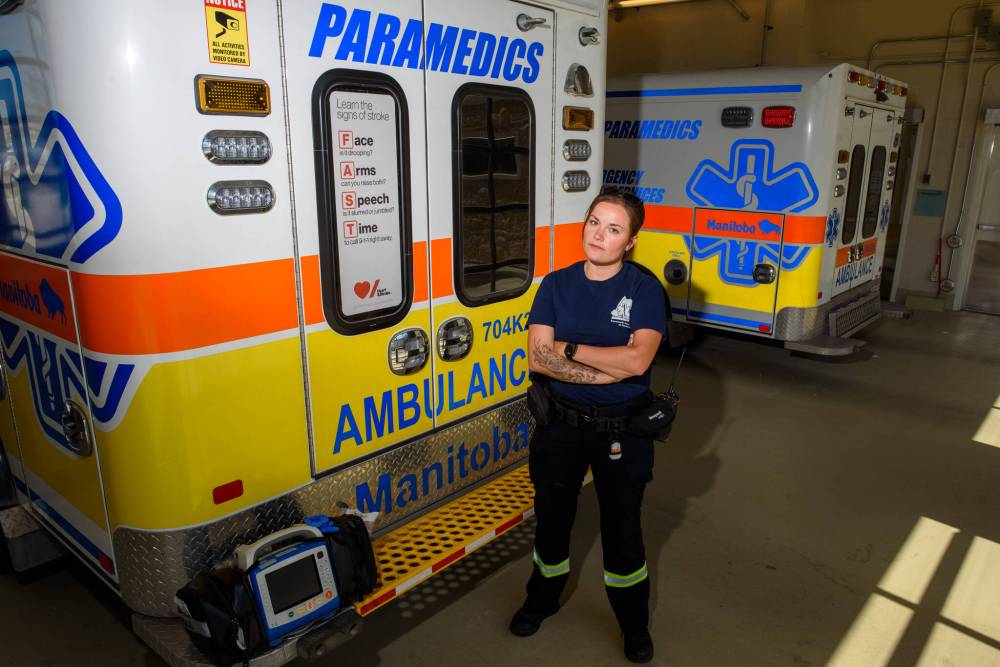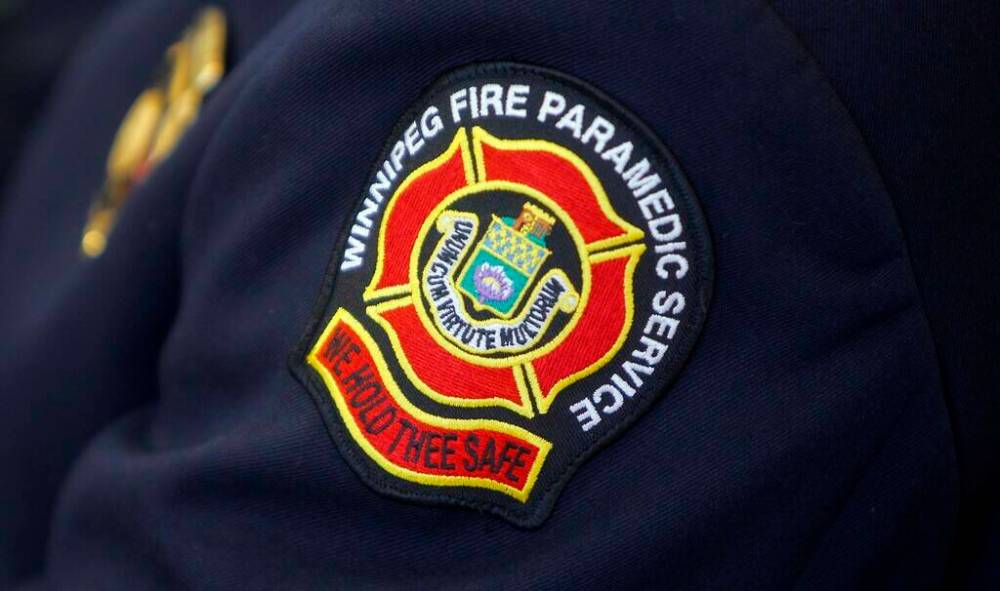No applicants for advanced paramedic course at RRC
Advertisement
Read this article for free:
or
Already have an account? Log in here »
To continue reading, please subscribe:
Monthly Digital Subscription
$0 for the first 4 weeks*
- Enjoy unlimited reading on winnipegfreepress.com
- Read the E-Edition, our digital replica newspaper
- Access News Break, our award-winning app
- Play interactive puzzles
*No charge for 4 weeks then price increases to the regular rate of $19.00 plus GST every four weeks. Offer available to new and qualified returning subscribers only. Cancel any time.
Monthly Digital Subscription
$4.75/week*
- Enjoy unlimited reading on winnipegfreepress.com
- Read the E-Edition, our digital replica newspaper
- Access News Break, our award-winning app
- Play interactive puzzles
*Billed as $19 plus GST every four weeks. Cancel any time.
To continue reading, please subscribe:
Add Free Press access to your Brandon Sun subscription for only an additional
$1 for the first 4 weeks*
*Your next subscription payment will increase by $1.00 and you will be charged $16.99 plus GST for four weeks. After four weeks, your payment will increase to $23.99 plus GST every four weeks.
Read unlimited articles for free today:
or
Already have an account? Log in here »
Hey there, time traveller!
This article was published 09/12/2022 (1092 days ago), so information in it may no longer be current.
The advanced care paramedic program at RRC Polytech, which is being expanded by the Manitoba government to help ease a chronic staff shortage, had zero applicants for its next class.
A course for entry-level primary care paramedic recruits is believed to be about 60 per cent full, said paramedics and groups that represent them.
They said interest in the ACP program is low because there are no advanced care jobs in rural and northern areas, despite a recommendation in a 2013 EMS review.
“It’s obviously concerning given the fact we are in the greatest staffing crisis that paramedicine has seen in Manitoba,” said Rebecca Clifton, administrative director of the Paramedic Association of Manitoba, about the enrolment figures. “Increasing seats is great, but that doesn’t matter when there’s nobody in those seats.”
JESSE BOILY / WINNIPEG FREE PRESS FILES Rebecca Clifton, administrative director of the Paramedic Association of Manitoba, said interest in the RRC advanced care paramedic program would be higher if there were opportunities for career advancement.
When it is questioned about efforts to address understaffing, wages or working conditions, the provincial government often recites an $8-million pledge to hire 35 primary care paramedics and expand ACP training with 32 refresher and 16 student seats at RRC.
RRC confirmed its ACP program had zero applicants for a class that was scheduled to begin next month.
“We continue to work with the government of Manitoba to deliver this program,” RRC spokeswoman Emily Doer wrote in an email. “Any applications received at this point will be considered for a potential spring intake.”
RRC’s website claims there is “high demand” for the two-year program, which allows practising primary care paramedics to expand their skills.
Advanced care paramedics provide a wider scope of care and can work in hospital emergency rooms when needed.
Clifton and Jason Linklater, president of the Manitoba Association of Health Care Professionals, which represents about 800 rural paramedics, said interest in the RRC programs would be higher if there were opportunities for career advancement.
They want ACP jobs to be created in rural and northern areas, where paramedics are employed by Shared Health.
Linklater and Clifton said there are rural PCPs who are currently qualified to work as ACPs.
The Winnipeg Fire Paramedic Service has its own training program for staff who want to become ACPs. Jobs in the private sector are scarce.
RRC’s ACP program costs about $15,000, and no one wants to spend that much money when jobs aren’t available, said Clifton, an intermediate care paramedic based in the Interlake.
A paramedic echoed that sentiment.
“Why would people want to spend that money and time when there’s no future? It’s a waste of money right now.”–anonymous paramedic
“Why would people want to spend that money and time when there’s no future? It’s a waste of money right now,” said the paramedic, who asked to remain anonymous.
Linklater said the provincial government’s pledge to add ACP training seats is a “mirage.”
“The paramedic crisis needs to be addressed, and this is not the way to make an impact,” he said.
Enrolment in RRC’s current primary care paramedicine class is believed to be about 60 per cent, say paramedics who spoke to the Free Press.
RRC wouldn’t say how many people are currently enrolled in the two-year program, which has an estimated cost of $10,000.
The course is “consistently” near capacity, and full enrolment of 40 students is anticipated in the next intake in the fall of 2023, said Doer.
She said there was a slight drop in 2020 due to an update in admission requirements, but enrolment has been increasing since then.
The paramedic who asked to remain anonymous believes potential applicants have been scared off by the media attention on tough working conditions.
“A lot of (staff) with mental health issues are quitting because there’s no support for these people,” said the paramedic.
The employee said more rural residents would pursue a career as a paramedic if courses were offered closer to them.
Aside from career progression, Linklater said paramedicine would be more appealing if rural staff had a contract and high wages.
BORIS MINKEVICH / WINNIPEG FREE PRESS FILES The advanced care paramedic program at RRC Polytech, which is being expanded by the Manitoba government to help ease a chronic staff shortage, had zero applicants for its next class.
Rural paramedics are among the allied health-care professionals who’ve been without a contract for about five years.
The MAHCP regularly receives calls from paramedics who are leaving the profession or taking jobs in Winnipeg, said Linklater.
The staff shortage is contributing to high levels of stress and burnout among staff, with ambulances being forced out of service and response times increasing, the union said.
Without real solutions, the crisis will continue for years, Clifton warned.
She described the province’s plan to hire 35 additional PCPs as a “drop in the bucket,” arguing 150 to 200 more paramedics are needed in rural Manitoba alone.
Shared Health, which oversees Manitoba’s emergency medical services, is committed to addressing the staff shortage, boosting intake at RRC and offering career advancement opportunities, a spokesman said.
“We are working with RRC Polytechnic to promote the next advanced care paramedic program intake, to ensure the intake is posted on time and that applicants are aware of new prerequisites that were added when the winter semester ACP program was posted later than usual,” the spokesman wrote in an email.
chris.kitching@freepress.mb.ca
Twitter: @chriskitching

Chris Kitching is a general assignment reporter at the Free Press. He began his newspaper career in 2001, with stops in Winnipeg, Toronto and London, England, along the way. After returning to Winnipeg, he joined the Free Press in 2021, and now covers a little bit of everything for the newspaper. Read more about Chris.
Every piece of reporting Chris produces is reviewed by an editing team before it is posted online or published in print — part of the Free Press‘s tradition, since 1872, of producing reliable independent journalism. Read more about Free Press’s history and mandate, and learn how our newsroom operates.
Our newsroom depends on a growing audience of readers to power our journalism. If you are not a paid reader, please consider becoming a subscriber.
Our newsroom depends on its audience of readers to power our journalism. Thank you for your support.
History
Updated on Friday, December 9, 2022 5:19 PM CST: Adjusts formatting

